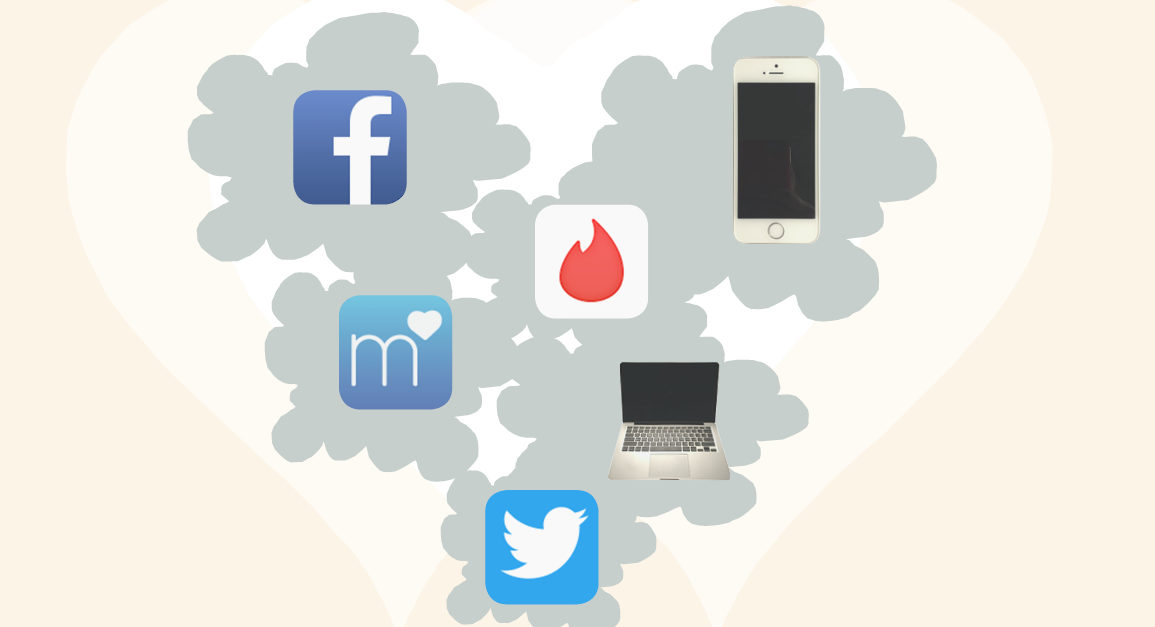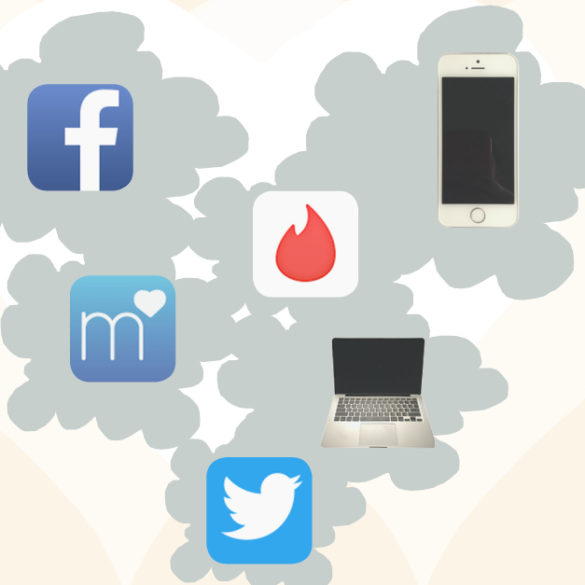Over the past 20 years, technological advances and social media have modified the way people interact with one another. Humans have only been carrying mobile phones for 40 years and using social media for 20, but it’s clear that these mediums have made a huge impact on the way relationships are formed, sustained, and finished. Text messages, Skype, Instagram, Facebook, and Tinder are just a few of the diverse media platforms people now use to communicate. The ability to be constantly connected can be a blessing, or a curse, for a number of reasons.
Many relationships begin and thrive because of advancements like the web and mobile devices. According to a study conducted at the University of Florida, around 35 percent of people who married between 2005 and 2012 began their relationship through an online source. This study included those who met through dating websites as well as social networking. It also showed that those who had met online had a slightly lower divorce rate than those who had met offline. Social media and other technological advances offer channels of communication for those in long distance relationships.
However, social media has also gained a negative reputation for Millennial romantic relationships. According to the study “CyberPsychology and Behavior” conducted at the Canadian University of Guelph, social media may be responsible for causing distrust and envy among those forming or involved in romantic relationships.
Ball Bearings sat down with four individuals to discuss how technology has blurred the lines of what it means to be in a healthy relationship: author and licensed therapist Jay Alevizon, communications professor Mary Moore, Millennial college student Donnie Dinehart, and college graduate Naomi Davis.
Ball Bearings: How do you define a “healthy relationship”?
Alevizon: Let’s say it must be a rewarding relationship for both people. That reciprocally, they’re both stronger for having the relationship. Having the relationship makes both stronger and fun.
Moore: I think trust is really important, as well as openness and honesty. Different people look for different things in relationships and those things need to be made clear by both involved. As long as both parties feel safe and secure, I think it’s a healthy relationship.
Dinehart: Communication is big. You have to be able to talk about your problems with your partner instead of just dropping everything and running. Trust is the most important thing to keep in mind. I also think time away from your boyfriend or girlfriend can be good for you and your relationship.
Davis: I think a healthy relationship requires respect. I think it’s required not just toward each other, but also there needs to be a respect for yourself to make sure that the person you’re with isn’t treating you in an unhealthy way. A healthy relationship requires giving unconditional love, but I think you have to love yourself before you can love another person.
BB: How would you describe the modern young adult relationships in comparison to previous generations?
Alevizon: I don’t think human nature changes drastically. There’s a longer period of development in current culture. Who’s to say if it’s good or bad.
Moore: The medium that is used to communicate is what has changed the most. There is also clear evidence that this generation is invested in the “hookup culture,” but it doesn’t appear that this generation has as many sexual partners as they used to back in the ’80s. I think this is why the term “friends with benefits” has become so popular.
Dinehart: I don’t think people are in it for the long haul anymore. I think people just wanted to be affiliated with somebody. I’m sure previous generations interacted similarly to our generation, but I think you see a lot more divorces and breakups now.
Davis: There’s no courtship anymore. No one is asking, ‘May I take you out on a date?’ anymore. I also think past generations were forced to get to know people face-to-face. [Now] you can make snap judgments based on people’s social media and how they text. So I feel like people aren’t getting to know each other on the deeper levels.
BB: What do you believe are the benefits and disadvantages of having such a technologically dependent generation, in regards to relationships?
Alevizon: It has the potential to be positive if it’s used as a tool that wasn’t available in previous centuries. But if it’s the primary way of interacting, you lose the personal touch – and that’s a huge detriment. A lot of it, like the social systems on the computer, is superficial. It could be good or bad depending on how it’s used.
Moore: I think it provides security in the beginning stages of relationships because many relationships don’t form out of fear of rejection. There’s lots of risks in telling someone how you feel face-to-face, which can be avoided by using these mediums. Consequently, people can take advantage of these channels by masking how they truly feel or using deception to come across a certain way that might not be sincere.
Dinehart: It allows you to show appreciation of your significant other to other people. But a lot of things on social media can be taken out of context. If you’re dating someone and they see you like someone else’s posts or favorite their tweet, they can feel like you’re going behind their back. A lot of people want their partner’s social media directed only towards them.
Davis: We have all these different ways of promoting ourselves that past generations didn’t have. I’ve been in long distance relationships and I never would have met these people were it not for technology. On the flipside, I don’t think I was as personable in these relationships. With technological based relationships, you lose people’s warmth and endearment.
BB: Why do you believe people are using social media to promote their romantic relationships, such as with the use of the hashtags “#mancrushmonday” and “#womancrushwednesday”?
Alevizon: I think it’s egotistical and selfish. I think it’s a way of playing at having a relationship – the relationships aren’t real. It’s a way of trying on different masks and you don’t put yourself at risk like in person-to-person contact.
Moore: In our culture, we value romantic relationships. It makes sense that people are interested in it. It tends to be a big part of what college students focus on. It’s almost a form of a public display of affection. It’s like when you’re at a theme park and you’re standing in line holding your significant other’s hand to signify that you’re in a relationship. I also think it’s a public form a flirting, which some people may find flattering, while others may find it embarrassing.
Dinehart: I’ve done it before, but I honestly don’t think it’s necessary. I think people think they have to be shown off on social media. I think that someone started doing it and now it’s just expected of people to post about their significant other. If someone’s significant other isn’t posting about them, they feel like they aren’t good enough to be posted about, which can really harm people’s self-image.
Davis: I think when people do that, they do it to draw attention to themselves, not their significant other. I think it’s more of an egotistical thing than anything else. A lot of people are just trying to compete with each other through social media. Maybe sometimes it is to acknowledge someone who’s been great to you, but ultimately I think it’s just trendy.
BB: How has the ability to “Facebook stalk” and “block” people shaped the definition of a healthy relationship?
Alevizon: I think it would depend upon the reasons why someone was doing that. It could serve as a way to not have direct human contact, but it also [could] be used by parents to screen the lovers of their children. Having more information is usually a good thing.
Moore: Jealousy is one of the most dangerous parts of relationships. It contradicts the notion of trust. Facebook stalking in particular is problematic because what’s public and what’s private blends. Social mediums construct reality, but they aren’t real. I think “blocking” is a a great way to cut ties from toxic relationships.
Dinehart: I think it’s definitely more of a harmful thing our generation does. “Facebook stalking” can cause trust issues. People often jump to conclusions when they’re stalking people on social media. I think blocking people is good if someone is driving you crazy, but it could really hurt someone’s feelings at the same time, so I think it’s important to keep that in mind.
Davis: I like having the ability to block people, because I can take negativity off of my timeline. But I also think that the ability to “Facebook stalk” promotes distrust. It could cause emotions that shouldn’t be there. I think people do it because they’re insecure. I would rather get to know a person than “creep” on them.
BB: How do you think the ability to constantly be in contact with people affects the way modern relationships function?
Alevizon: I would find that nightmarish. My generation valued more time alone, without the constant intrusion of electronic contacts or real people contacts. The idea of being alone has changed radically in the last 40 years. I think if you want to make someone anxious you could just take away their cell phone.
Moore: It destroys the need for important things in a relationship, such as shared experiences. And even sometimes when people do share experiences with their romantic partner, they aren’t truly experiencing it because they’re invested in their technology. People may not always be present with each other. I do, however, think it helps those in long distance relationships be able to maintain a healthy relationship. But we are creatures of touch, and I think that’s necessary.
Dinehart: I think people feel obligated to text people all the time. I hate to say it, but my girlfriend is kind of that way. If I’m not texting her back, she automatically assumes something is wrong. I think people can often get self-conscious and think, ‘Well, you have the ability to talk to me all the time. Why aren’t you?’
Davis: It’s good because you never feel alone. It’s a great feeling knowing that someone can be accessible if you need them. But you never get that sense of feeling that you could just disappear for a moment. I feel like no one enjoys their own company anymore.
BB: Ultimately, does technology help or harm young adults trying to form and evolve romantic relationships?
Alevizon: It depends upon the person. Again, it’s a wonderful tool if used as a tool. If it’s the central part of a person’s existence and substitutes direct human contact for electronic contact, I think it’s a huge loss.
Moore: If I have to weigh on one side, I would say it causes more problems. This is especially true for those whose romantic partners are in close proximity. But I do think there are lots of benefits. I think if people used it properly, they could communicate in ways you couldn’t before. The problems occur when technology replaces the face-to-face interactions.
Dinehart: I’d say it’s more harmful. It’s really hard to get to know someone over technology. You have to spend time with a person face-to-face to really get to know who they are as a person. I think people aren’t the same online as they are in person.
Davis: I think it helps. It’s helped me be in two healthy, long-distance relationships that I would never regret having. I felt cherished because someone had to put in the effort to make me a priority in their life. Technology can bring out the best or the worst in people and I think that just depends on who you are as a person.
Ball Bearings has edited down content for clarity.




